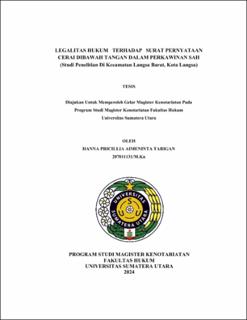| dc.contributor.advisor | Sembiring, Rosnidar | |
| dc.contributor.advisor | Maria | |
| dc.contributor.advisor | Sembiring, Idha Aprilyana | |
| dc.contributor.author | Tarigan, Hanna Pricillia Aimeninta | |
| dc.date.accessioned | 2024-10-31T08:23:07Z | |
| dc.date.available | 2024-10-31T08:23:07Z | |
| dc.date.issued | 2024 | |
| dc.identifier.uri | https://repositori.usu.ac.id/handle/123456789/98509 | |
| dc.description.abstract | Divorce is the dissolution of marriage or the breakdown of marital relations. The implementation of divorce in the West Langsa District of Langsa City, Aceh Province, still occurs within the community through unofficial channels, contrary to legal provisions. The formulation of the problems is how the implementation of divorce occurs unofficially in the West Langsa District, what are the legal consequences of unofficial divorce in the West Langsa District, and what legal protection efforts are available to the parties involved.
This research is of the empirical juridical type. It involves the identification of unwritten laws intended to understand the unwritten laws based on prevailing legal principles in the legal system in Indonesia, namely customary law and Islamic law. In this research, interactions with community members who are the subjects of the study necessitate adherence to many unwritten rules prevailing in the community, one of which is the unwritten rule mentioned.
The research findings indicate that the implementation of divorce in the West Langsa District is primarily carried out by economically disadvantaged individuals, typically through unofficial channels, conducted in the presence of village elders and village officials. Legal consequences arising from unofficial divorce in the West Langsa District include the lack of divorce certificates for wives, difficulties in remarrying, failure to receive iddah rights, and certainty regarding the division of joint property: Legal protection efforts for the parties involved due to unofficial divorce in the West Langsa District involve filing legal claims through the Langsa Sharia Court. For parties unable to afford legal fees, they may file for divorce by talak or contested divorce with all costs borne by the Langsa Sharia Court. It is recommended that the community, especially those in the West Langsa District, file for divorce through the court system. Village authorities are encouraged to direct their residents to file for divorce through the court or Sharia Court. Additionally, the Langsa Sharia Court is advised to conduct outreach on pro bono and pro deo programs to inform the public that legal claims can be made without financial burden, thereby preventing unofficial divorce practices. | en_US |
| dc.language.iso | id | en_US |
| dc.publisher | Universitas Sumatera Utara | en_US |
| dc.subject | Legality | en_US |
| dc.subject | Statement Letter | en_US |
| dc.subject | Unofficial Divorce | en_US |
| dc.title | Legalitas Hukum terhadap Surat Pernyataan Cerai Dibawah Tangan dalam Perkawinan Sah (Studi Penelitian di Kecamatan Langsa Barat, Kota Langsa) | en_US |
| dc.title.alternative | Legal Status of Unregistered Divorce Statements in Legal Marriages (Study Conducted in Langsa Barat District Langsa City) | en_US |
| dc.type | Thesis | en_US |
| dc.identifier.nim | NIM207011131 | |
| dc.identifier.nidn | NIDN0002026602 | |
| dc.identifier.nidn | NIDN0025126010 | |
| dc.identifier.nidn | NIDN0014047609 | |
| dc.identifier.kodeprodi | KODEPRODI74102#Kenotariatan | |
| dc.description.pages | 120 Pages | en_US |
| dc.description.type | Tesis Magister | en_US |
| dc.subject.sdgs | SDGs 16. Peace, Justice And Strong Institutions | en_US |


